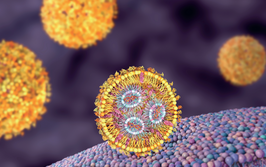
Embracing the Medical Potential of Cannabinoids
Initial research into the uses of medical cannabis suggests applications across a range of diseases, but research is needed to realize cannabis’ full medical potential.
One of Richard Nixon’s less well known misdemeanours was, in 1970, to make cannabis a Schedule 1 substance, which frustrated researchers interested in the plant’s medical applications. In November 2016, the US lifted a federal cultivation restriction that hindered cannabis research by US academic institutions. Whilst the societal arguments for the full legalisation or decriminalization of cannabis are strong, they are still a matter of debate. However, what is becoming difficult to ignore is the growing evidence that cannabis has medically beneficial properties.
The easing of cultivation restrictions for US academic institutions is indicative of the larger shift by the pharmaceutical industry back towards re-examining natural products (“NPs”, chemical compounds or substances produced by living organisms i.e. animals, plants, bacteria and fungi) as a source of medicine. The 1990s saw a green rush of bioprospecting by the pharmaceutical industry as it sought to mine Earth’s biodiversity. However, despite significant success (the vast majority of today’s antibiotics are derived from natural products), by the 2000s most pharmaceutical companies had terminated their natural product discovery programmes, citing difficulties in obtaining samples at sufficient yields, ecological and legal restrictions, and insufficient capital investment in natural product discovery programs as the reasons to do so.
However, the challenges of drug design, such as long development times and potentially high toxicity, has seen a shift back towards natural products as potential sources of new drug treatments. Because they occur naturally, potential drugs derived from NPs have quicker development times, and are more likely to pass toxicity studies. Furthermore, the fact that natural product pathways are highly complex, which often makes it challenging to synthesize natural compounds in the lab, has led to the development of drugs that are standardized, plant-based extracts containing a number of quantified compounds, in addition to the more accepted method of isolating specific compounds.
In this context, the three-primary species of cannabis (Cannabis sativa, Cannabis indica, and Cannabis ruderalis) remain an interesting potential source of medicine. Firstly, historic restrictions have stymied much of the research that would have occurred in the 1990s, a period during which many other natural products were investigated for medical use there. It can therefore be expected that there is still significant medical potential for cannabis that has not been uncovered.
Secondly, most research on cannabis has focused on the known major cannabinoids – in particular THC and CBD – and on the two key receptors that they bind to (CB1 and CB2 receptors, found in every mammal). When analyzing the potential applications of this research, pharmaceutical companies have tended to focus on screening their currently existing libraries of molecules against these receptors, but have not concentrated on studying the effects that other molecules (e.g., naturally occurring minor cannabinoids) have on them.
It is here where the most exciting medical potential lies. Beyond some excellent studies in Israel, little work has been conducted into the effects of minor cannabinoids and their combinations on CB1 and CB2 receptors. Recent years have seen such large improvements in cannabinoid extraction, purification, and isolation techniques, and more minor cannabinoids are still being identified. At a time where natural product research is again in vogue and where whole plant extracts form the basis of regulator approved medication, the positive effects of minor cannabinoids deserve to be explored in detail.
Finally, the weight of evidence from existing studies is becoming too large to ignore. Over the last ten years, studies have suggested that cannabinoids have the potential to help across multiple indications. While the positive effects of cannabis on pain have long been anticipated, it has become apparent that it could have a beneficial effect on various medical disorders, such as multiple sclerosis, epilepsy, Parkinson’s, glaucoma, and numerous cancers. However, as both last year’s independent UK review and this year’s US National Academy of Sciences study point out, due to the restrictions imposed on the cannabis research, the limitation with many of these studies is that they were carried out without adequate control trials, or with too small a sample size, rendering them largely anecdotal. However, they all point to one fact: we must find out more about the molecular properties of cannabis to fully utilize its potential.
And whatever the medical applications of cannabis ultimately transpire to be, given the potential, it would be unwise and a missed medical opportunity not to explore them. It is for this reason that Oxford University and Kingsley Capital Partners have launched a pioneering research program to investigate the role of cannabinoids in biology and medicine. The programme combines Oxford’s world leading research and clinical expertise in cancer, immunology, and neuroscience, with Kingsley’s network of experts and financial support in the therapeutic cannabinoid market. The program aims to address largely unmet medical need in pain, cancer, and inflammatory disease, through the development of new therapies for acute and chronic conditions, and is a tangible step in adding significant legitimacy to the industry.
This research programme at Oxford is a step in the right direction, building on several new initiatives started by innovative companies and academic institutions across the world. Cannabis has already been used by many as a therapeutic aid for centuries – now is the time to harness 21st century science to understand its mode of action. As a plant based natural product, it already has a headstart on many synthetically formulated drugs. It makes sense to explore it in the most rigorous way possible. A few years from now, and with a little luck, it could help millions of patients suffering from debilitating disorders.
Neil Mahapatra is Managing Partner of UK investment firm Kingsley Capital Partners, which established Oxford Cannabinoid Technologies in conjunction with a large-scale research programme with Oxford University.


















